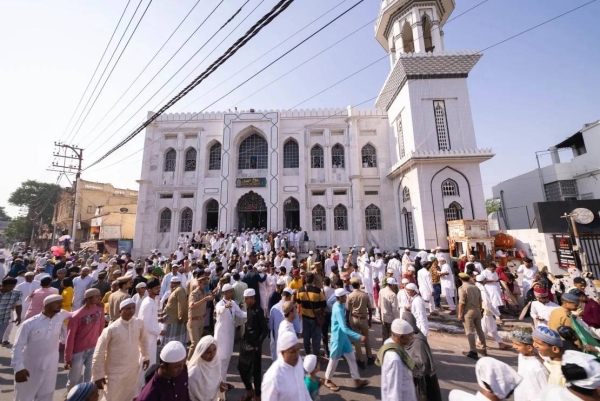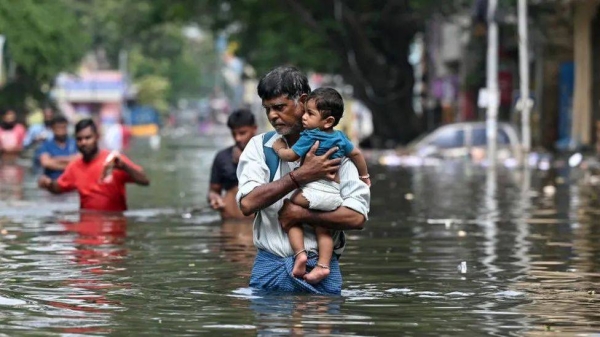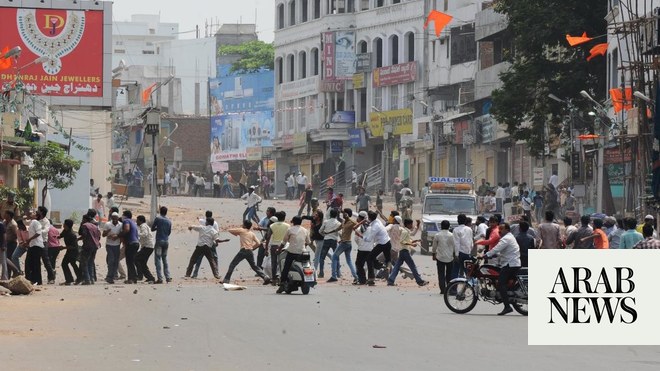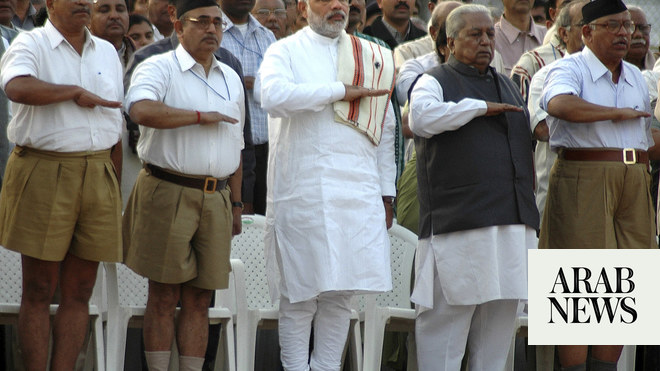
The sun glistens on the Ganges as Hindu devotees bathe in the holy river’s waters, and the Muslim call to prayer reverberates through the dusty air. Varanasi, an ancient city of temples and gods, is India’s spiritual capital. And here, in Prime Minister Narendra Modi’s political stronghold, tensions between the two faiths are escalating.
When Modi chose this holy city as his constituency a decade ago, it was the perfect setting for him to meld his party’s political and religious ambitions. Having risen to power on a promise of development and anti-corruption, his Bharatiya Janata Party (BJP) now stands accused of turning India – a nation constitutionally bound to secularism – into a Hindu rashtra, or homeland.
As Sana Sabah celebrated the Muslim festival of Eid with her family in Varanasi, she raised these fears with trepidation in her voice.
“It’s scary that someone like Modi ... is not only celebrated but validated,” the 33-year-old entrepreneur said. The Hindu-nationalist right wing, she said, “is not even trying to hide it anymore. And it’s troublesome.”
With voting now underway in the world’s most populous nation, a significant portion of its more than 200 million strong Muslim population express fear at the prospect of Modi’s re-election. Vying for a rare third term in power, he is defending his seat in the traffic-clogged, diverse city of some 1.7 million people.
Yet, 10 years after his ascension, many of Varanasi’s Muslims feel neglected, even betrayed, especially now as a centuries old-mosque becomes the latest flashpoint in a case that tests India’s secular fabric.
Local Muslim leader Syed Mohammad Yaseen, 78, feels the government is failing to protect his community, which he says is feeling increasingly vulnerable and fearful of hate crimes in today’s India.
“The worst will happen (if Modi gets reelected),” he said from his office in Varanasi. “We are tolerating these things, maybe one day there can be change. But we are hopeless.”
Modi’s BJP has its roots in the Rashtriya Swayamsevak Sangh (RSS), a right-wing paramilitary organization that advocates Hindu supremacy within India – though the party has repeatedly said it does not discriminate against minorities.
“There is not one welfare scheme where religion, or community, is used as a base to discriminate,” said BJP Varanasi leader Dileep Patel, referring to the government’s welfare programs. “The prime minister’s schemes (programs) apply to our Muslim brothers, Hindu brothers, Sikhs, Jains, Buddhists, and Parsis, who have, without any discrimination, benefited from Modi.”
There is no doubt that Modi’s decade in power has been transformative. India has arrived on the world stage, inching ever closer to global-power status, boasting the fastest-growing major economy, and making great strides in technology and space.
But there is also no doubt that religious polarization has increased.
Hindu nationalists have been appointed to top positions in key government institutions, giving them the power to make sweeping changes to legislation that rights groups say unfairly target Muslims. Textbooks have been rewritten to downplay the history of India’s ancient Islamic rulers, cities and streets with Mughal-era names renamed and Muslim properties have been demolished by authorities for illegal encroachment on government land and as punishment for alleged rioting.
In 2019, Modi removed the special autonomy of Jammu and Kashmir – India’s only Muslim-majority state – bringing it under the direct control of New Delhi. That same year, his administration passed a controversial citizenship law that excludes Muslim migrants, giving rise to deadly riots.
Nasir Ali recalls the evening, weeks after the law’s enactment, when right-wing Hindu mobs gathered near his home in New Delhi, chanting anti-Islam slogans, attacking property and harassing residents. He was bringing his sister home from a hospital in a taxi. He felt safe, he said, because “this was the capital, Delhi, and it was daytime.”
But as his taxi approached the streets, Ali saw the mob. “Among them, there was a man who took out his pistol and fired at me. He started chanting ‘Jai Shree Sri Ram’ (a Hindu religious slogan) and ran away,” says Ali.
Ali says he believes he was shot because of his Muslim faith, and said it was a neighbor who pulled the trigger.
He attempted to file a police complaint at his local station against the alleged perpetrators, a 2021 Delhi court order seen by CNN shows. But the police did not register his complaint, nor properly investigate, the court order said.
The local Bhajanpura Police have since disputed those findings, and the case is winding its way through the legal system, with the next hearing expected in September, according to Ali’s lawyer. CNN has contacted Bhajanpura Police for comment.
The riots were described as some of the worst sectarian violence in decades, leaving dozens, mostly Muslims, dead. Delhi police made about 800 arrests, according to a report shared by the Office of the United Nations High Commissioner for Human Rights.
Ali, who was blinded in one eye, now says he is wary of letting his fellow citizens know he is Muslim. “We do not let anyone realize (our religion),” he said. “We hide our names as well.”
Moments of large-scale violence like those Delhi riots often make national or international headlines. But it is the day-to-day incidents which spring up all over India that many say characterize the way life has changed for so many of India’s Muslims under Modi.
When Usman, 28, moved from Kashmir to northwestern Rajasthan state for work in 2021, he said he struggled to find a home for weeks, visiting broker after broker in the city of Jaipur, who looked at his name and had one remark: “This is going to be a problem.”
“It’s a given, a Muslim will face a struggle finding an apartment,” said Usman, who asked CNN to use only his first name, citing privacy concerns. “Things were bad before. Now, it’s become worse.”
CNN has verified dozens of social media videos that paint a stark picture of religious divisions.
In one from March this year, a policeman can be seen kicking Muslims offering prayers on the side of the road in New Delhi. In another from the western state of Gujarat last year, right-wing groups projected “Jai Shree Ram” on the walls of a mosque. In an incident that shocked the nation in August, a railway police officer opened fire on a moving train, killing three Muslim passengers and a Hindu constable, while allegedly advocating for Modi’s leadership.
Anti-Muslim speech has also risen dramatically, a recent report by the Washington-based research group India Hate Lab showed, which documented 668 such cases in 2023.
BJP politician T. Raja Singh openly called for violence against Muslims in an October speech in Rajasthan, proclaiming: “If they (Muslims) take one Hindu girl, we’ll take 10 of theirs.” At another event, he allegedly said: “You (Muslims) are half cut (circumcised), we will cut you fully.”
India prohibits hate speech under several sections of its penal code, including a section that criminalizes “deliberate and malicious acts” intended to insult religious beliefs. Singh is facing a slew of police investigations, including for his alleged hate speeches, but in October last year he was fielded as a BJP candidate in state elections – winning his seat for the third time in a row.
CNN has contacted Singh for a response.
Analysts say the lack of repercussions for vitriolic comments has given extremists tacit support, making them even more brazen. Many Muslims fear this rise poses a danger to their communities – and worry it may only get worse as India votes in this election.
Multiple human rights organizations, including Human Rights Watch, Amnesty International and the International Federation for Human Rights have warned of continued discrimination against religious minorities, particularly Muslims, over the past decade, and have repeatedly called on authorities to end it.
BJP National Spokesperson Jaiveer Shergill has said his party is not prejudiced against Muslims, and the community has benefited from Modi’s leadership. “India’s constitution protects the Indian democracy. No political party in country is strong enough to bulldoze the Constitution, to bulldoze the will of the people,” he said.
Yet, critics have pointed to the lack of representation within the BJP. Despite being a party that claims to represent all Indians it doesn’t have a single Muslim lawmaker.
This week, Modi himself sparked a row over hate speech while campaigning in Rajasthan, a BJP ruled-state, when he accused Muslims – who have been present in India for centuries – of being “infiltrators,” and echoing a false conspiracy voiced by some Hindu nationalists that Muslims are displacing the country’s Hindu population by deliberately having large families.
The speech caused widespread anger among Muslims leaders and opposition politicians as well as calls for election authorities to investigate the comments. BJP party spokespeople subsequently said Modi was talking about undocumented migrants.
Shamsher Ali, a shopkeeper in Varanasi, fears for his two young daughters growing up in an increasingly polarized India. Ali looks back at his childhood – a time when, he says, Muslim-Hindu camaraderie was the norm.
Muslims haven’t felt this level of fear in years, Ali says.
“So much hate has been sown that people now look at each other with suspicion ... the tensions have become so bad that a Hindu and a Muslim can’t even see eye to eye,” the 45-year-old said. “This government is relying on driving a wedge between the two communities.”
Meters from Ali’s shop, the Gyanvapi Mosque has become the latest battleground between Hindu nationalists and Varanasi’s Muslims.
The mosque was built in the 17th century by Mughal Emperor Aurangzeb. It is widely believed a temple devoted to Lord Shiva on the same site was destroyed to make way for it. A different Hindu temple was subsequently built nearby in 1780 and for centuries, Hindus and Muslims prayed at their respective sites side by side, the temple’s gold stripes standing alongside the mosque’s white domes.
“Muslim women would wear their niqab (Muslim traditional dress) and Muslim men with their skullcaps would frequent the Ghats nearby (a holy Hindu area),” Ali recalled.
But now, the Gyanvapi Mosque sits at the apex of a wider legal campaign to reclaim places of worship, and Hindu nationalists are demanding it back. Its fate is being debated across courtrooms in India, in a case that will have ramifications nationwide.
In May 2022, a court survey claimed to find an artifact that resembled a Hindu relic inside the building. Muslims question the conclusion of the survey, saying it runs counter to their own findings.
In January, a Varanasi court ruled that Hindus could offer prayer in the basement of the mosque.
“Today, the police is against us. I don’t have faith in the judiciary,” said Yaseen, the local Muslim leader, from his office filled with documents related to the case. “They are giving judgment, but not justice.”
Outside the temple gates, guards patrol the area. Monkeys scale the walls of the complex, unconcerned by the high security and barbed-wire fence that fortifies the mosque. On the streets, vendors sell marigold flowers, and saffron flags fly high on shops and buildings.
The incident has echoes of another major flashpoint – the 16th century Babri mosque in Ayodhya. It was demolished by Hindu hardliners in a 1992 attack, sparking deadly riots, in an incident that helped turbocharge the BJP from a fringe party to a major player.
Earlier this year, Modi inaugurated a vast Hindu temple on the site, the culmination of a decades-long campaign and an event seen as a seminal moment by India’s leader – one, critics say, pulled the country away from its constitutionally secular foundations.
“(Today) is the beginning of a new time cycle,” Modi said at the new temple. “After centuries of waiting, our Ram has arrived.”
Dressed in a saffron robe with religious beads draped around his neck, Hindu priest Swami Jitendranand Saraswati doesn’t think fears harbored by Muslims are substantiated.
“If they are saying they feel like they are second-class citizens, then this makes me happy,” he said with a smile, as worshippers touched his feet while bringing offerings to his small temple.
He believes Gyanvapi is not a mosque, but a Hindu temple, and wants to see his community worship inside the walls of the building. Swami Saraswati also wants his community to reclaim some 3,000 more Hindu places of worship allegedly destroyed by Mughals centuries ago.
“The Hindu community wants its lost self-respect back. The Hindu community wants its places of worship back,” he said.
Amit Pandey, the general secretary of the BJP’s youth wing in Varanasi, says India is a Hindu nation, and claims that all the country’s Muslims “were forcibly converted and made slaves by changing their religion” from Hinduism centuries ago.
Mainstream historians paint a much more complicated picture, where the South Asian subcontinent experienced waves of migration, invasion, colonialism, trading, conversion and assimilation over the centuries that created the multifaith giant of today’s India.
But not all Hindus are supporters of a Hindu nationalist narrative.
Vishwambhar Nath Mishra, the priest of a prominent Hindu temple in Varanasi, believes Modi’s stoking of religious tensions is ruining the fabric of Indian society. Varanasi, he noted, is a spiritual center, home to all faiths.
“All practices are allowed, and they help each other grow,” Mishra said, standing outside his temple near the banks of the Ganges.
“Christianity, Muslims, Buddhism, Hinduism ... they live here in good harmony. And if we have any differences, we sit across the platform and we discuss the issues. This unique fabric is in a strained condition now. We have a fear that this fabric may break.”
The sentiment is echoed by Ali in his Varanasi shop, where he fears for his community’s survival.
“Muslims have anyway become untouchables in this government,” he said.
“People say leave the country, but we say we were born here. We will be buried in the soil of this land. This is my country.” — CNN












